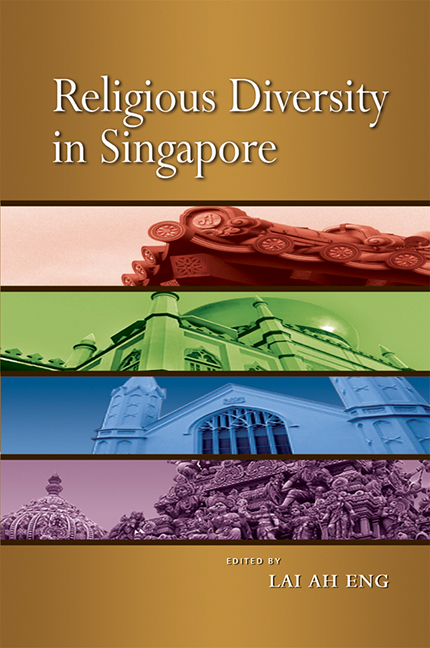Book contents
- Frontmatter
- Contents
- List of Figures and Tables
- List of Appendices
- FOREWORD
- PREFACE
- Acknowledgements
- The Contributors
- Abbreviations
- Glossary
- INTRODUCTION
- PART I The Landscape of Religious Diversity
- PART II Religion in Schools and Among the Young
- PART III Religion in the Media
- PART IV Religious Organizations in Social Services
- 19 Muslim Organizations and Mosques as Social Service Providers
- 20 Hindu Temples in Charities and Social Services
- 21 Delivering Welfare Services in Singapore: A Strategic Partnership between Buddhism and the State
- 22 Saving the City through Good Works: Christian Involvement in Social Services
- PART V Interfaith Issues and Interaction
- Index
19 - Muslim Organizations and Mosques as Social Service Providers
from PART IV - Religious Organizations in Social Services
Published online by Cambridge University Press: 21 October 2015
- Frontmatter
- Contents
- List of Figures and Tables
- List of Appendices
- FOREWORD
- PREFACE
- Acknowledgements
- The Contributors
- Abbreviations
- Glossary
- INTRODUCTION
- PART I The Landscape of Religious Diversity
- PART II Religion in Schools and Among the Young
- PART III Religion in the Media
- PART IV Religious Organizations in Social Services
- 19 Muslim Organizations and Mosques as Social Service Providers
- 20 Hindu Temples in Charities and Social Services
- 21 Delivering Welfare Services in Singapore: A Strategic Partnership between Buddhism and the State
- 22 Saving the City through Good Works: Christian Involvement in Social Services
- PART V Interfaith Issues and Interaction
- Index
Summary
INTRODUCTION
Muslim groups providing various social services that address a range of needs have existed in Singapore since the nineteenth century.1 But it was only from the early twentieth century onwards that they evolved into formal organizations. Religious motivations as well as the spirit of gotong royong (cooperation and helping one another) for which the Malay-Muslim community is well known inform and underpin many of these provisions. Equally significant, these Muslim organizations do not exist in isolation but are often interacting with their counterparts from other religious and secular backgrounds.
Broadly, the social services provided by Muslim groups fall within two categories: those provided by Muslim organizations (MOs) and those by mosques. This study focuses on the social services provided by both types of organizations in Singapore, along the following main themes:
their history and development,
the major activities and services offered,
the motivations and factors underlying the provision of social services,
external relationships and collaborations with state agencies and other organizations (both faith-based and secular) and principles and factors underlying these collaborations, and
issues, problems and challenges encountered in social service provision. Correspondingly, this chapter is presented in two distinct parts: social services provided by Muslim agencies, and social services provided by mosques.
PART 1: PROVISION OF SOCIAL SERVICES BY MUSLIM ORGANIZATIONS
DEVELOPMENT OF SOCIAL SERVICES: FROM GOTONG-ROYONG TO FORMAL HELP
The Muslim community is well known for its spirit of gotong-royong (Mendaki 2002, p. 103; MUIS 1994, p. 82; Li 1990, p. 132 and Lee 1991, pp. 256–59). Gotong-royong is the spirit of shared effort to lighten the burdens faced by an individual or a small group within the community, and entails members pitching in to help and to ensure that a task or event is a success. All involved do their part with minimal fuss. In the context of the larger community, the spirit of gotong-royong has been the driving force behind many Muslim organizations in Singapore for generations (MUIS 1994, p. 82).
- Type
- Chapter
- Information
- Religious Diversity in Singapore , pp. 459 - 488Publisher: ISEAS–Yusof Ishak InstitutePrint publication year: 2008



